There’s something deeply satisfying about cooking with tools that feel as good in your hands as the meals taste on your plate. In a world filled with plastic and mass-produced kitchen gadgets, olive wood utensils bring warmth, tradition, and elegance back into everyday cooking. With their rich grain patterns, silky-smooth finish, and natural antibacterial properties, these handcrafted tools aren’t just practical—they’re personal.
If you’ve ever had a favorite spatula break mid-stir or noticed a strange taste leaching from plastic into your food, you’re not alone. Many home cooks are now ditching cheap, synthetic utensils in search of something more durable, more beautiful, and better for their health and the planet. Olive wood, with its natural strength and timeless appeal, offers the perfect solution—lasting for years when properly cared for, and elevating your kitchen with rustic charm.
Whether you’re sautéing vegetables, stirring soups, or serving a fresh salad, olive wood utensils connect you with your food in a more meaningful way. In this guide, we’ll explore the best olive wood utensils for 2025—tools that combine function and aesthetics to help you cook with confidence, protect your cookware, and add a touch of artisan craftsmanship to your kitchen routine.
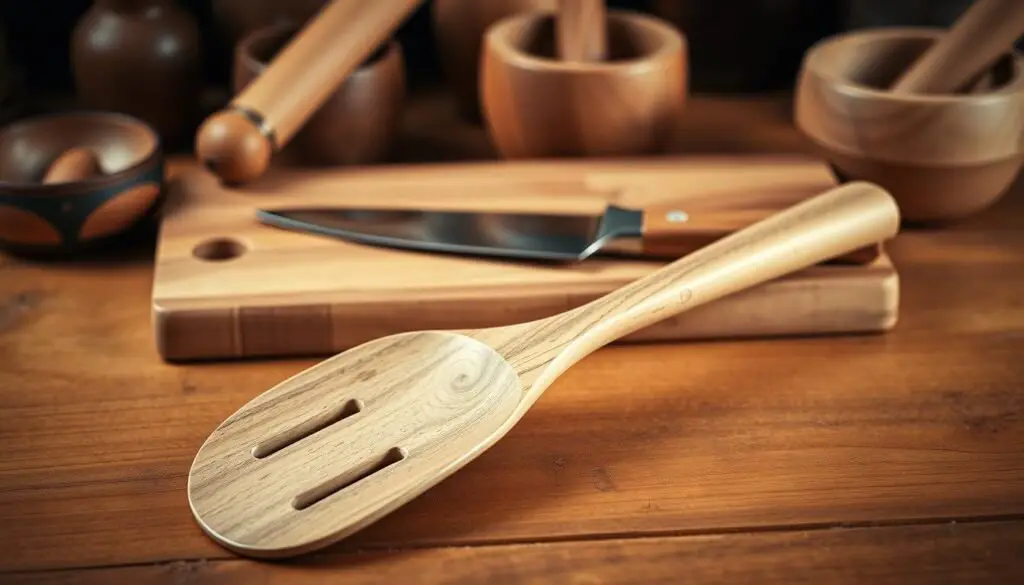
What Makes Olive Wood Special for Cooking Utensils
Olive wood is dense and hardwood, making it resistant to scratches and cracks. This density also ensures that it doesn’t absorb flavors or odors from food, keeping your cooking utensils fresh and clean. Moreover, olive wood has a natural antibacterial property that helps in maintaining hygiene in the kitchen.
The aesthetic appeal of olive wood lies in its unique grain patterns, which not only add a touch of elegance to your kitchen but also make each utensil distinct. The wood’s natural color and texture bring warmth to your cooking experience.
Health and Environmental Benefits
Olive wood cooking utensils are not only beneficial for cooking but also offer health and environmental advantages. The natural antibacterial properties of olive wood reduce the need for chemical sanitizers, promoting a healthier kitchen environment.
From an environmental perspective, olive wood is a sustainable resource. Olive trees are cultivated in many parts of the world, and using their wood for utensils reduces waste and supports eco-friendly practices. Moreover, olive wood utensils are biodegradable, minimizing their environmental footprint.
By choosing olive wood cooking utensils, you’re opting for a product that is both healthy and environmentally friendly, aligning with the growing demand for eco-friendly kitchen tools.
Best Olive Wood Utensils for Every Kitchen
WOTTISH Olive Wood Utensils Set
Pros
- Authentic Mediterranean Olive Wood: Made from 100% natural olive wood, each utensil is unique and rich.
- Non-Toxic and Eco-Friendly: Free from varnishes or harmful chemicals—just natural oil for a food-safe finish.
- Versatile Tool Set: Includes essential utensils like spoons and spatulas ideal for stirring, serving, and sautéing.
- Scratch-Free Cooking: Gentle on nonstick and delicate cookware surfaces.
Cons
- Regular Oiling Needed: To maintain the wood’s sheen and durability, it needs periodic oiling.
- Wood Grain Variability: Natural wood variation may result in color differences between utensils
Features: The WOTTISH Olive Wood Utensils Set offers a practical and elegant solution for home cooks seeking quality, longevity, and style in their kitchen tools. Sourced from aged olive trees and handcrafted with care, this set is designed to withstand daily use while adding a rustic, warm aesthetic to your cooking space.
Forest Decor Olive Wood Utensils Set for Cooking
Pros
- Handcrafted Elegance: Each piece is handmade, offering a truly unique and artisan touch to your kitchen.
- Durable and Dense: Crafted from high-quality Mediterranean olive wood, these utensils are resistant to cracking and splintering.
- Gentle on Cookware: Safe for use on nonstick surfaces—won’t scratch or damage your pots and pans.
- Sustainably Made: Ethically sourced from pruned olive trees, making it an eco-conscious choice.
Cons
- Higher Price Point: Due to its handcrafted nature, this set may be more expensive than machine-made alternatives.
- Not Dishwasher Safe: Requires handwashing and proper drying to preserve quality.
Features: The Forest Decor Olive Wood Utensils Set is a handcrafted collection made for those who value quality, sustainability, and aesthetic beauty in their kitchen tools. Each utensil is carved from a single piece of aged olive wood, ensuring strength and a seamless design. The set includes a range of tools for mixing, stirring, and serving, making it both a functional and decorative addition to any kitchen.
The Live Edge Olive Wood Spatula for Cooking
Pros
- Unique Live Edge Design: Features a natural, uncut edge that showcases the raw beauty of olive wood.
- Handcrafted Quality: Each spatula is handmade, ensuring no two pieces are exactly alike.
- Perfect for Nonstick Cookware: Smooth and gentle surface protects your pans from scratches.
- Durable and Dense: Olive wood’s natural hardness makes it resistant to cracking and breaking over time.
Cons
- Single Tool Only: Unlike utensil sets, it’s sold as an individual spatula, so it lacks versatility on its own.
- Live Edge Not for Everyone: The rustic edge may feel uneven or unfamiliar to some users.
Features: The Live Edge Olive Wood Spatula is a standout piece for home chefs who appreciate raw beauty and artisanal craftsmanship. Unlike mass-produced utensils, this spatula is shaped to preserve the natural curves and bark edge of the olive tree, making it both a functional tool and a conversation piece.
Traditional vs. Modern Olive Wood Utensils
From ancient traditions to contemporary kitchenware, olive wood utensils showcase a fascinating evolution. This transformation is not just about aesthetics; it’s also about functionality and the integration of heritage craftsmanship with modern needs.
The journey of olive wood utensils from traditional to modern is marked by a blend of timeless techniques and innovative designs. Traditional olive wood utensils are often characterized by their rustic charm and the evident handcrafted touch, reflecting a deep-rooted cultural heritage. In contrast, modern olive wood kitchen tools incorporate sleek designs and advanced functionality, catering to the contemporary cook’s demands.
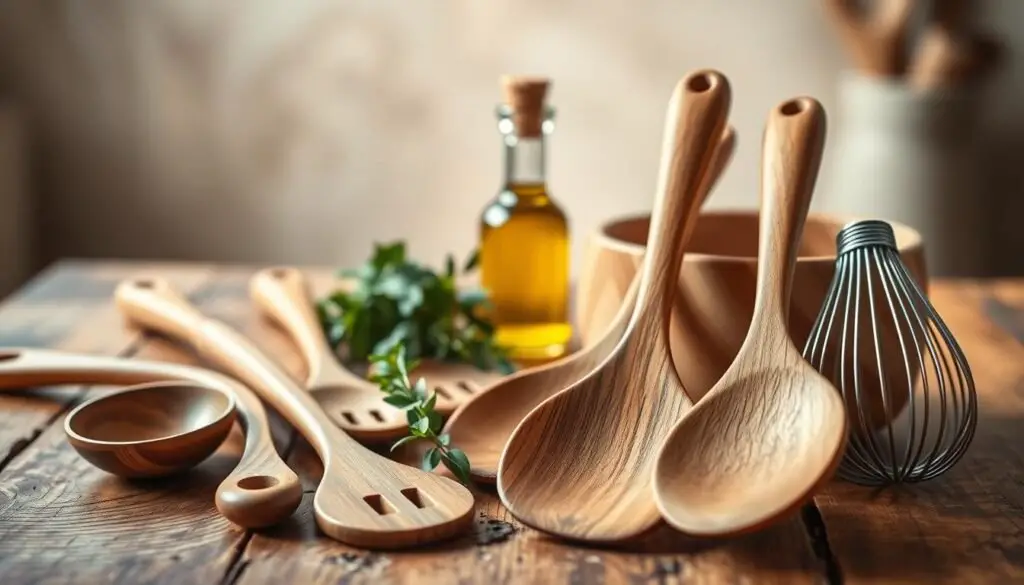
How to Choose Quality Olive Wood Utensils
Olive wood utensils offer a unique blend of functionality and aesthetics, but how do you choose the best ones? Selecting high-quality olive wood utensils involves understanding their characteristics, craftsmanship, and how these factors impact their performance and durability.
Grain Patterns and Wood Quality Indicators
The grain pattern of olive wood is one of its most distinctive features. Look for utensils with a pronounced grain pattern, as this indicates the wood’s natural beauty and durability. Other quality indicators include the absence of cracks, knots, or other defects that could compromise the utensil’s integrity.
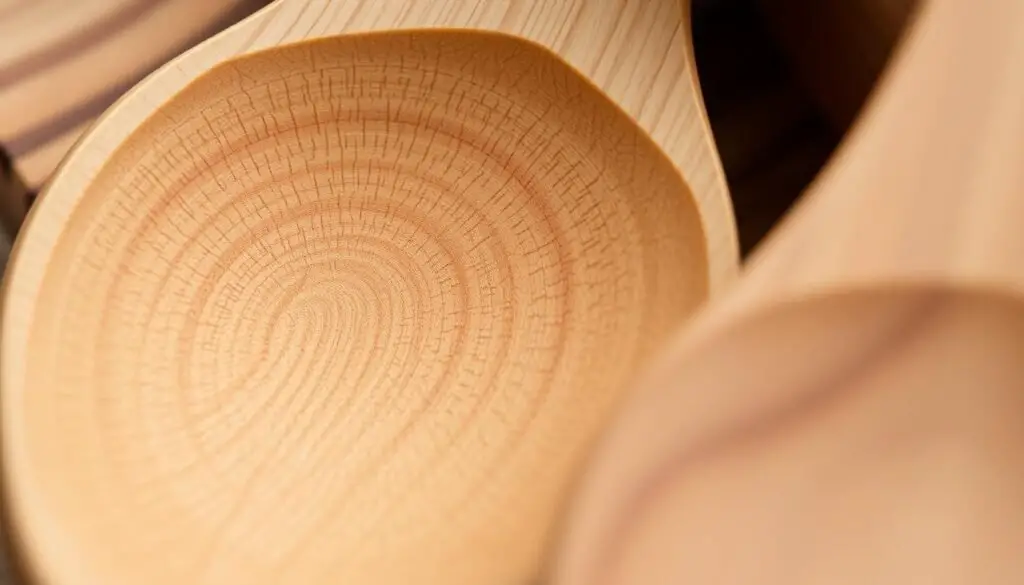
Craftsmanship Details to Look For
The craftsmanship of olive wood utensils is a critical factor in their quality. Check for smooth finishes and ensure that the utensils are well-balanced and comfortable to hold. The joints and handles should be securely attached, indicating careful attention to detail.
Price vs. Quality Considerations
When it comes to olive wood utensils, the price can be a reflection of quality. Very cheap options may indicate lower-quality wood or poor craftsmanship. However, high prices don’t always guarantee quality. It’s essential to balance price with the other quality indicators mentioned.
How to Care for Your Olive Wood Utensils?
Cleaning and Maintenance Tips
Cleaning your olive wood utensils is straightforward. Wash them by hand with mild soap and warm water. Avoid soaking them or putting them in the dishwasher, as excessive moisture can cause warping or cracking. Dry your utensils immediately after washing, and occasionally apply a food-safe oil to keep the wood moisturized.
- Wipe clean with a damp cloth after use
- Use mild soap for hand washing
- Dry thoroughly to prevent moisture damage
- Occasionally, oil with a food-safe product
Extending the Lifespan of Olive Wood
To extend the life of your olive wood utensils, avoid exposing them to extreme temperatures or direct sunlight for prolonged periods. Regularly oiling your utensils will help maintain their appearance and prevent drying.
Care Tip | Benefit |
Regular oiling | Prevents drying and cracking |
Avoiding extreme temperatures | Reduces risk of warping or cracking |
Hand washing and drying | Maintains the wood’s natural integrity |
FAQS
Q. What are the benefits of using olive wood utensils?
Olive wood utensils are durable, resistant to scratches and cracks, and have natural antibacterial properties. They are also eco-friendly and sustainable, making them a great choice for cooking and serving.
Q. How do I clean and maintain my olive wood utensils?
To clean olive wood utensils, simply wipe them down with a damp cloth and mild soap. Avoid using harsh chemicals or abrasive cleaners, as they can damage the wood. Regularly oiling your olive wood utensils can also help to maintain their quality and extend their lifespan.
Q. Are olive wood utensils safe to use with food?
Yes, olive wood utensils are safe to use with food. They are non-toxic and gentle on cookware, making them a great choice for cooking and serving a variety of dishes.
Q. Can I put my olive wood utensils in the dishwasher?
It’s generally not recommended to put olive wood utensils in the dishwasher, as the high heat and harsh chemicals can damage the wood. Instead, wash them by hand with mild soap and dry them thoroughly to maintain their quality.
Q. How do I choose high-quality olive wood utensils?
To choose high-quality olive wood utensils, look for products with a smooth finish, even grain pattern, and sturdy construction. Also, consider the craftsmanship and attention to detail that have gone into creating the utensils.
Q. What are some popular brands of olive wood utensils?
Some popular brands of olive wood utensils include Tramanto, Eddington, Berard France, Scanwood, Naturally Med, and Zassenhaus. These brands offer a range of high-quality olive wood utensils that are both functional and stylish.
Q. Can olive wood utensils be used for high-heat cooking?
Yes, olive wood utensils can be used for high-heat cooking, but it’s essential to take care when using them at high temperatures. Avoid exposing them to extreme heat or flames, as this can cause damage to the wood.
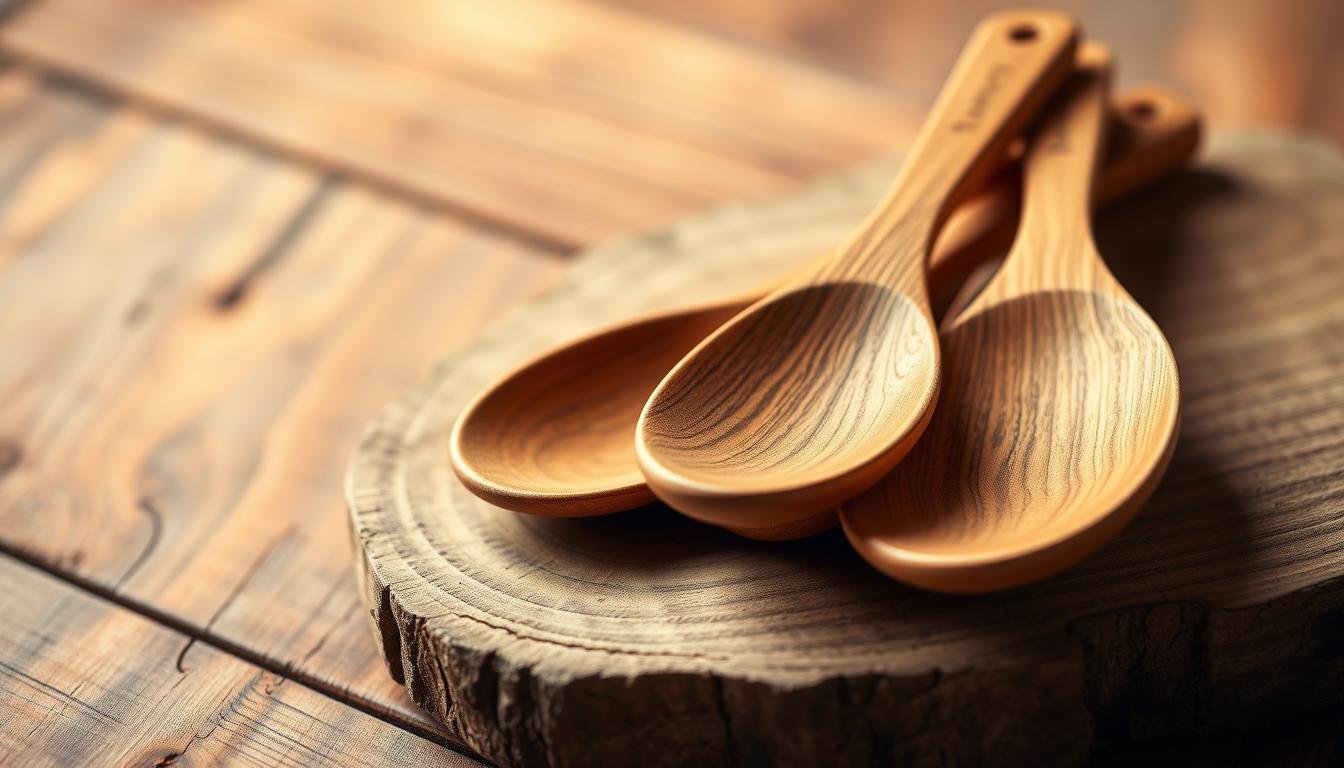
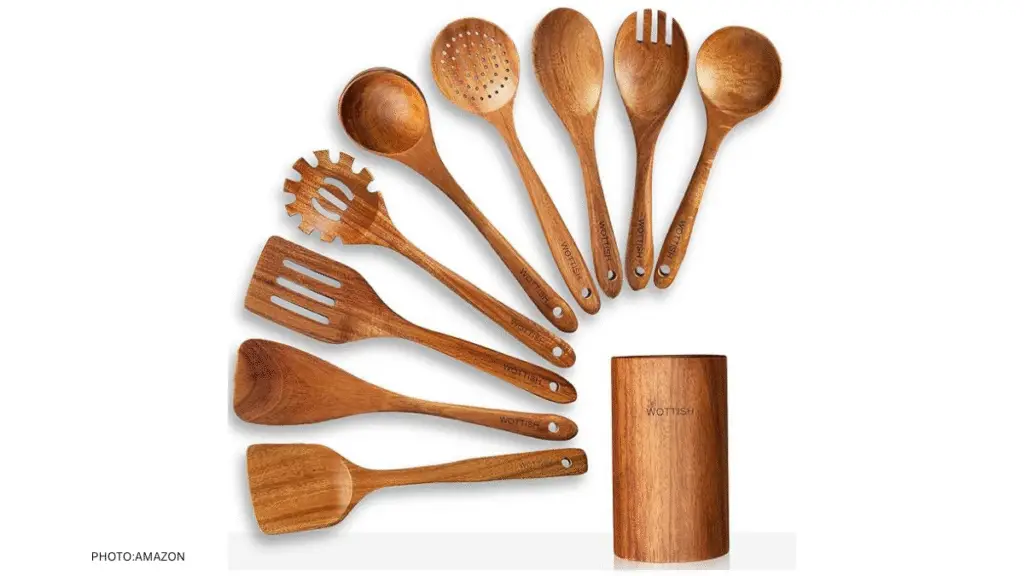
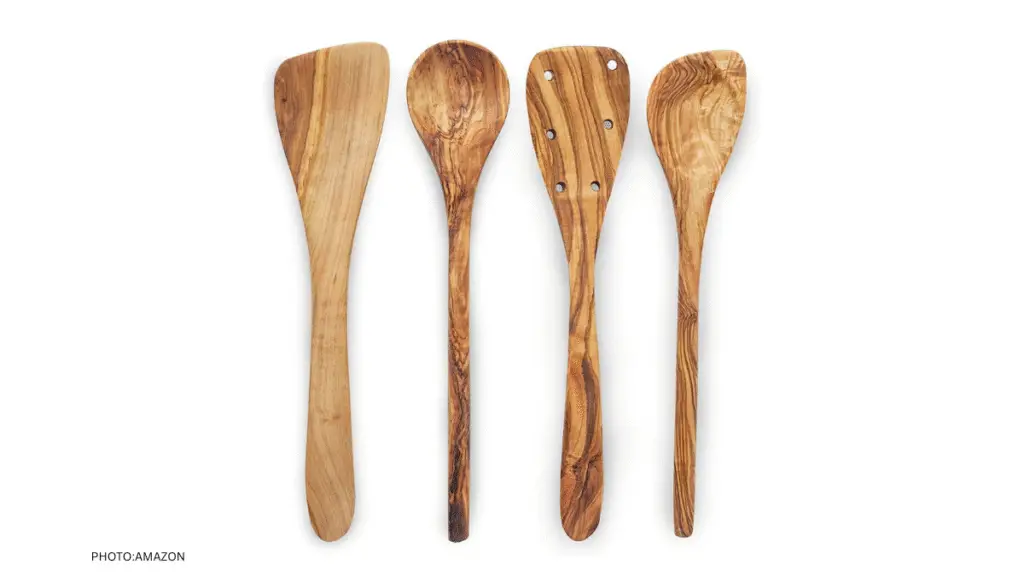
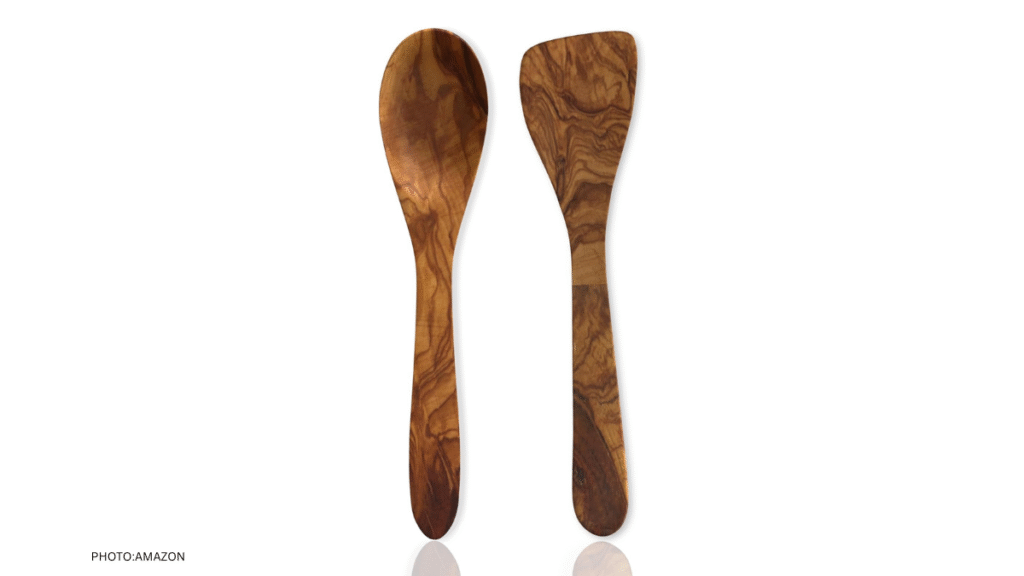
Leave a Reply